Practicing sentiment analysis with Harry Potter
library(tidyverse)
library(tidytext)
library(harrypotter)
set.seed(1234)
theme_set(theme_minimal())
Run the code below in your console to download this exercise as a set of R scripts.
usethis::use_course("cis-ds/text-analysis-fundamentals-and-sentiment-analysis")
Load Harry Potter text
Run the following code to download the harrypotter package:
remotes::install_github("bradleyboehmke/harrypotter")
Note that there is a different package available on CRAN also called harrypotter. This is an entirely different package. If you just run install.packages("harrypotter"), you will get an error.
library(harrypotter)
# names of each book
hp_books <- c(
"philosophers_stone", "chamber_of_secrets",
"prisoner_of_azkaban", "goblet_of_fire",
"order_of_the_phoenix", "half_blood_prince",
"deathly_hallows"
)
# combine books into a list
hp_words <- list(
philosophers_stone,
chamber_of_secrets,
prisoner_of_azkaban,
goblet_of_fire,
order_of_the_phoenix,
half_blood_prince,
deathly_hallows
) %>%
# name each list element
set_names(hp_books) %>%
# convert each book to a data frame and merge into a single data frame
map_df(as_tibble, .id = "book") %>%
# convert book to a factor
mutate(book = factor(book, levels = hp_books)) %>%
# remove empty chapters
drop_na(value) %>%
# create a chapter id column
group_by(book) %>%
mutate(chapter = row_number(book)) %>%
ungroup() %>%
# tokenize the data frame
unnest_tokens(word, value)
hp_words
## # A tibble: 1,089,386 × 3
## book chapter word
## <fct> <int> <chr>
## 1 philosophers_stone 1 the
## 2 philosophers_stone 1 boy
## 3 philosophers_stone 1 who
## 4 philosophers_stone 1 lived
## 5 philosophers_stone 1 mr
## 6 philosophers_stone 1 and
## 7 philosophers_stone 1 mrs
## 8 philosophers_stone 1 dursley
## 9 philosophers_stone 1 of
## 10 philosophers_stone 1 number
## # … with 1,089,376 more rows
## # ℹ Use `print(n = ...)` to see more rows
Most frequent words, by book
Remove stop words.
hp_words %>%
# delete stopwords
anti_join(stop_words) %>%
# summarize count per word per book
count(book, word) %>%
# get top 15 words per book
group_by(book) %>%
slice_max(order_by = n, n = 15) %>%
mutate(word = reorder_within(word, n, book)) %>%
# create barplot
ggplot(aes(x = word, y = n, fill = book)) +
geom_col(color = "black") +
scale_x_reordered() +
labs(
title = "Most frequent words in Harry Potter",
x = NULL,
y = "Word count"
) +
facet_wrap(facets = vars(book), scales = "free") +
coord_flip() +
theme(legend.position = "none")
## Joining, by = "word"
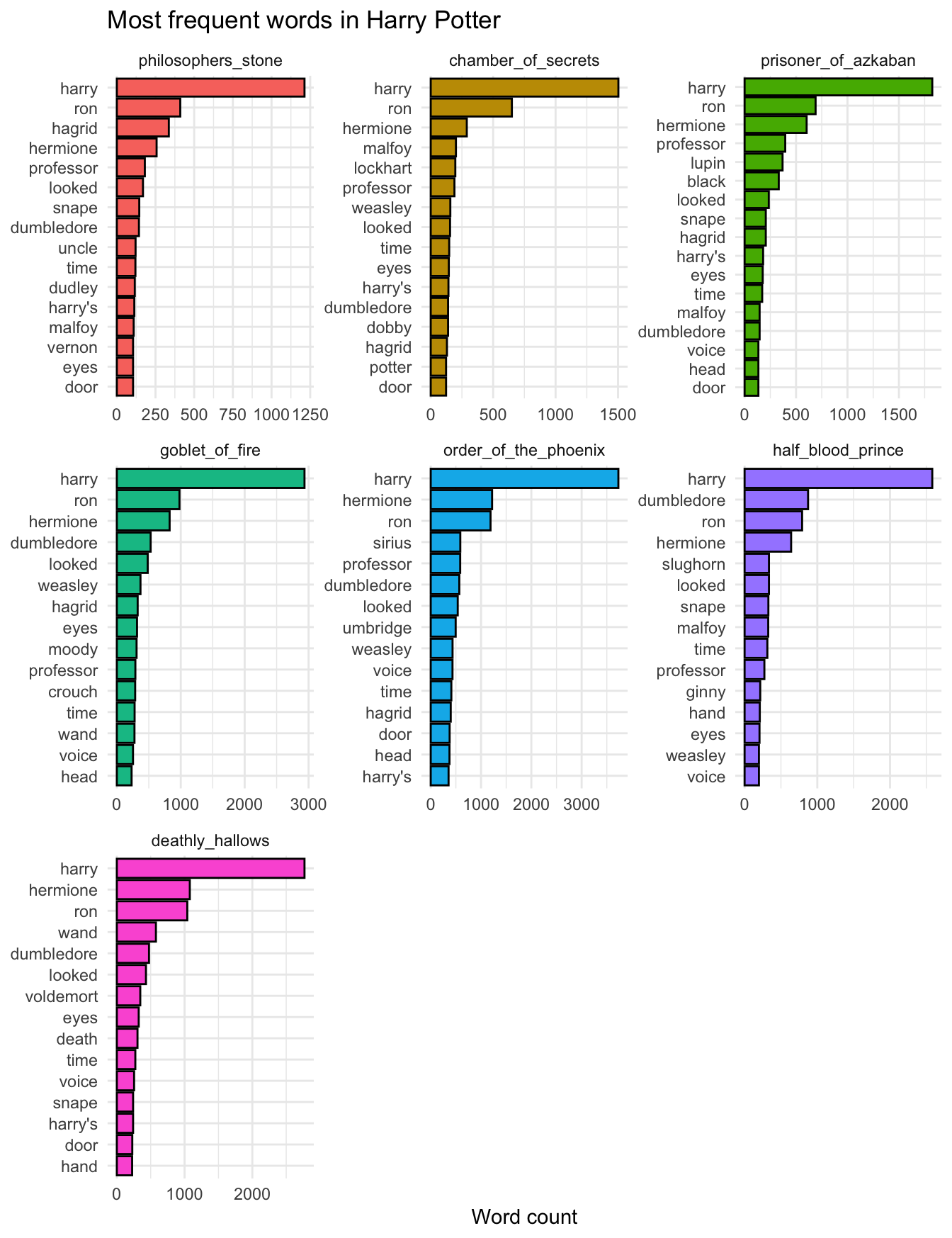
Estimate sentiment
Generate data frame with sentiment derived from the Bing dictionary
Click for the solution
(hp_bing <- hp_words %>%
inner_join(get_sentiments("bing")))
## Joining, by = "word"
## # A tibble: 65,094 × 4
## book chapter word sentiment
## <fct> <int> <chr> <chr>
## 1 philosophers_stone 1 proud positive
## 2 philosophers_stone 1 perfectly positive
## 3 philosophers_stone 1 thank positive
## 4 philosophers_stone 1 strange negative
## 5 philosophers_stone 1 mysterious negative
## 6 philosophers_stone 1 nonsense negative
## 7 philosophers_stone 1 useful positive
## 8 philosophers_stone 1 finer positive
## 9 philosophers_stone 1 greatest positive
## 10 philosophers_stone 1 fear negative
## # … with 65,084 more rows
## # ℹ Use `print(n = ...)` to see more rows
Visualize the most frequent positive/negative words in the entire series using the Bing dictionary, and then separately for each book
reorder_within() and scale_x_reordered() functions for sorting bar charts within each facet.Click for the solution
# all series
hp_bing %>%
# generate frequency count for each word and sentiment
group_by(sentiment) %>%
count(word) %>%
# extract 10 most frequent pos/neg words
group_by(sentiment) %>%
slice_max(order_by = n, n = 10) %>%
# prep data for sorting each word independently by facet
mutate(word = reorder_within(word, n, sentiment)) %>%
# generate the bar plot
ggplot(aes(word, n, fill = sentiment)) +
geom_col(show.legend = FALSE) +
# used with reorder_within() to label the axis tick marks
scale_x_reordered() +
facet_wrap(facets = vars(sentiment), scales = "free_y") +
labs(
title = "Sentimental words used in the Harry Potter series",
x = NULL,
y = "Number of occurences in all seven books"
) +
coord_flip()
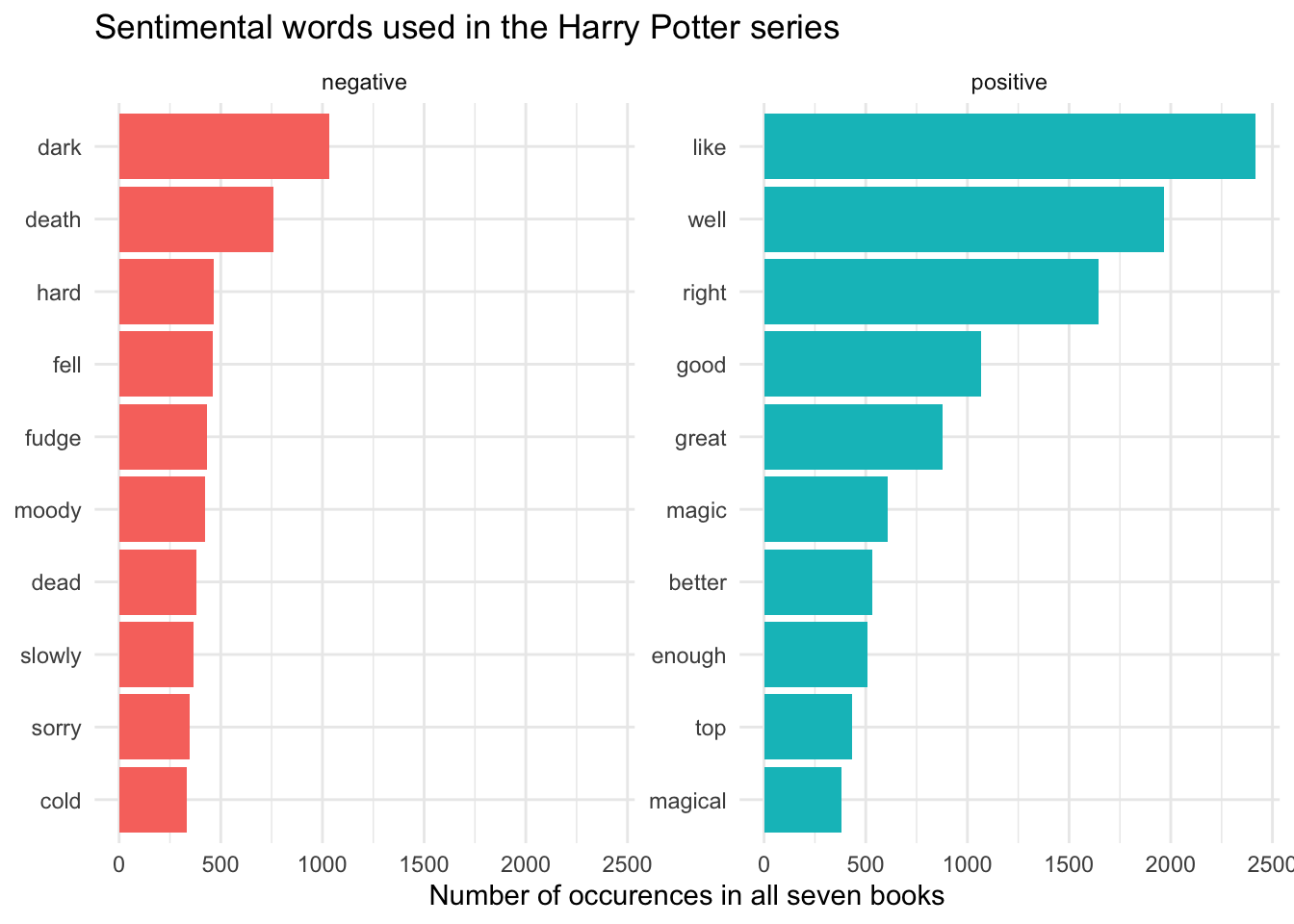
# per book
hp_pos_neg_book <- hp_bing %>%
# generate frequency count for each book, word, and sentiment
group_by(book, sentiment) %>%
count(word) %>%
# extract 10 most frequent pos/neg words per book
group_by(book, sentiment) %>%
slice_max(order_by = n, n = 10)
## positive words
hp_pos_neg_book %>%
filter(sentiment == "positive") %>%
mutate(word = reorder_within(word, n, book)) %>%
ggplot(aes(word, n)) +
geom_col(show.legend = FALSE) +
scale_x_reordered() +
facet_wrap(facets = vars(book), scales = "free_y") +
labs(
title = "Positive words used in the Harry Potter series",
x = NULL,
y = "Number of occurences"
) +
coord_flip()
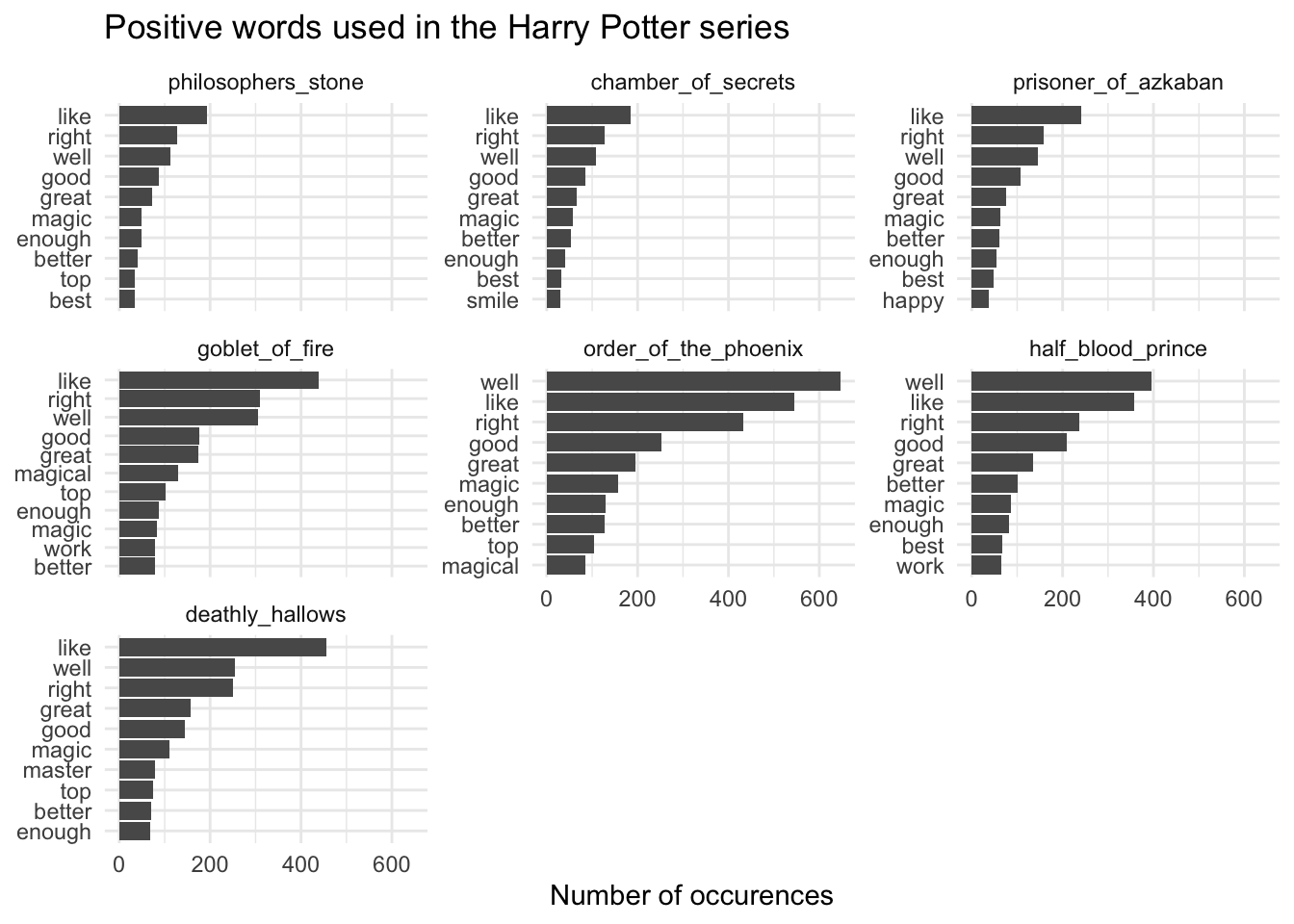
## negative words
hp_pos_neg_book %>%
filter(sentiment == "negative") %>%
mutate(word = reorder_within(word, n, book)) %>%
ggplot(aes(word, n)) +
geom_col(show.legend = FALSE) +
scale_x_reordered() +
facet_wrap(facets = vars(book), scales = "free_y") +
labs(
title = "Negative words used in the Harry Potter series",
x = NULL,
y = "Number of occurences"
) +
coord_flip()
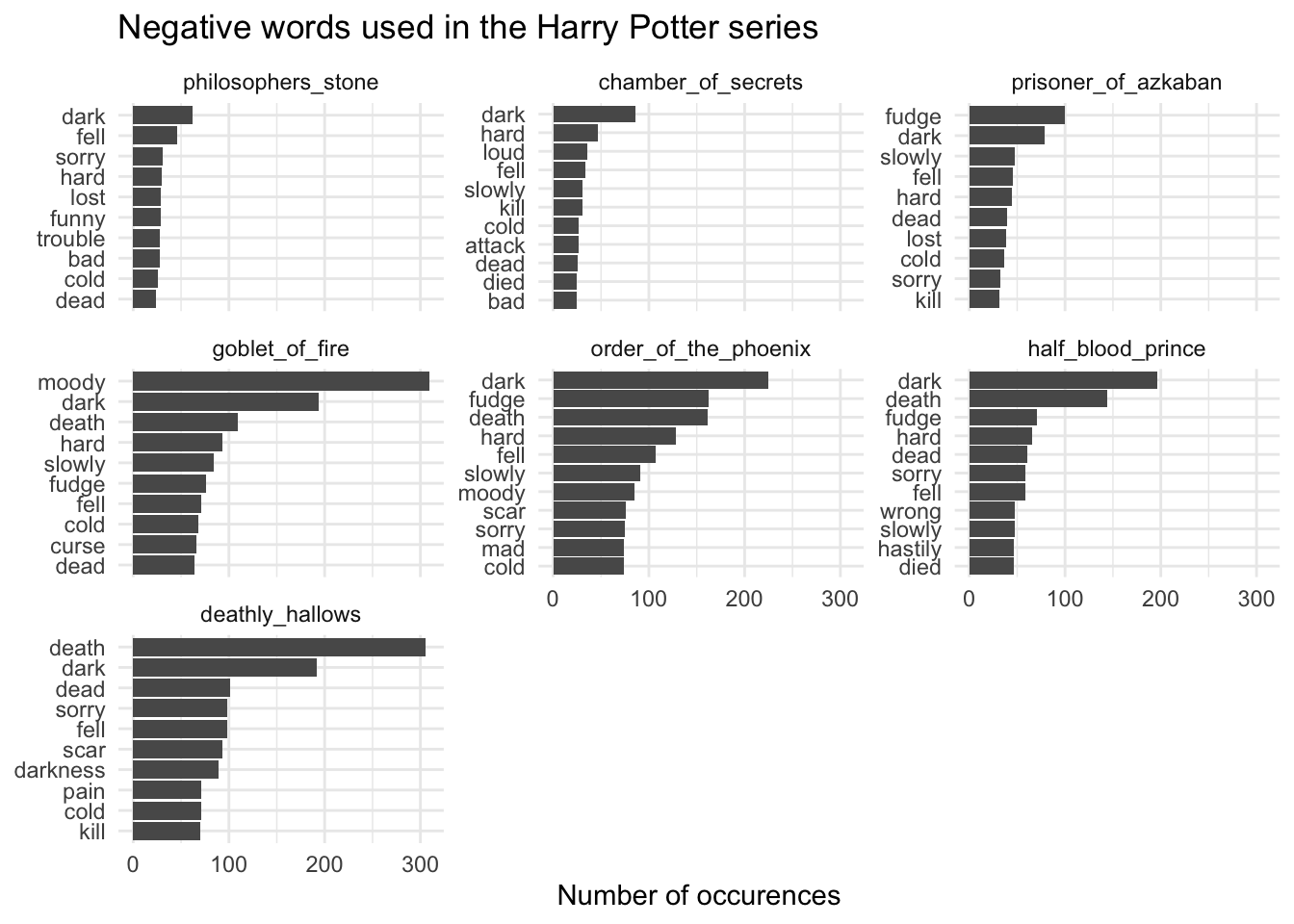
Generate data frame with sentiment derived from the AFINN dictionary
Click for the solution
(hp_afinn <- hp_words %>%
inner_join(get_sentiments("afinn")) %>%
group_by(book, chapter))
## Joining, by = "word"
## # A tibble: 56,311 × 4
## # Groups: book, chapter [200]
## book chapter word value
## <fct> <int> <chr> <dbl>
## 1 philosophers_stone 1 proud 2
## 2 philosophers_stone 1 perfectly 3
## 3 philosophers_stone 1 thank 2
## 4 philosophers_stone 1 strange -1
## 5 philosophers_stone 1 nonsense -2
## 6 philosophers_stone 1 big 1
## 7 philosophers_stone 1 useful 2
## 8 philosophers_stone 1 no -1
## 9 philosophers_stone 1 greatest 3
## 10 philosophers_stone 1 fear -2
## # … with 56,301 more rows
## # ℹ Use `print(n = ...)` to see more rows
Visualize which words in the AFINN sentiment dictionary appear most frequently
Sometimes words which are defined in a general sentiment dictionary can be outliers in specific contexts. That is, an author may use a word without intending to convey a specific sentiment but the dictionary defines it in a certain way.
We can use a wordcloud as a quick check to see if there are any outliers in the context of Harry Potter, constructed using ggwordcloud:
library(ggwordcloud)
set.seed(123) # ensure reproducibility of the wordcloud
hp_afinn %>%
# count word frequency across books
ungroup() %>%
count(word) %>%
# keep only top 100 words for wordcloud
slice_max(order_by = n, n = 100) %>%
mutate(angle = 90 * sample(c(0, 1), n(), replace = TRUE, prob = c(70, 30))) %>%
ggplot(aes(label = word, size = n, angle = angle)) +
geom_text_wordcloud(rm_outside = TRUE) +
scale_size_area(max_size = 15) +
ggtitle("Most frequent tokens in Harry Potter") +
theme_minimal()
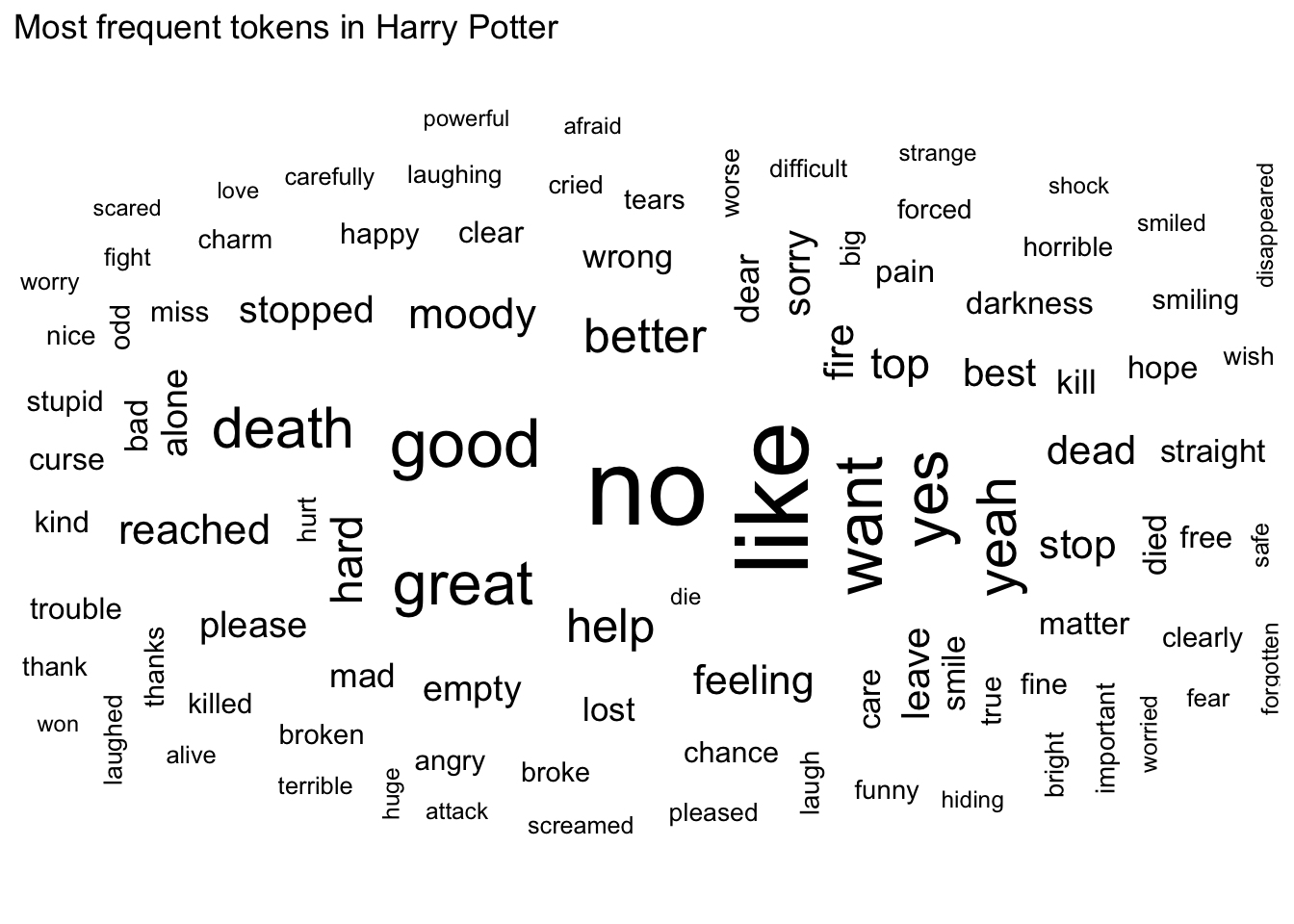
As we can see, “moody” appears quite frequently in the books. In the vast majority of appearances, “moody” is used to refer to the character Alastor “Mad-Eye” Moody and is not meant to convey a specific sentiment.
hp_afinn %>%
filter(word == "moody")
## # A tibble: 422 × 4
## # Groups: book, chapter [48]
## book chapter word value
## <fct> <int> <chr> <dbl>
## 1 chamber_of_secrets 13 moody -1
## 2 goblet_of_fire 11 moody -1
## 3 goblet_of_fire 11 moody -1
## 4 goblet_of_fire 11 moody -1
## 5 goblet_of_fire 12 moody -1
## 6 goblet_of_fire 12 moody -1
## 7 goblet_of_fire 12 moody -1
## 8 goblet_of_fire 12 moody -1
## 9 goblet_of_fire 12 moody -1
## 10 goblet_of_fire 12 moody -1
## # … with 412 more rows
## # ℹ Use `print(n = ...)` to see more rows
It would be best to remove this word from further sentiment analysis, treating it as if it were another stop word.
hp_afinn <- hp_afinn %>%
filter(word != "moody")
# wordcloud without harry
set.seed(123) # ensure reproducibility of the wordcloud
hp_afinn %>%
# count word frequency across books
ungroup() %>%
count(word) %>%
# keep only top 100 words for wordcloud
slice_max(order_by = n, n = 100) %>%
mutate(angle = 90 * sample(c(0, 1), n(), replace = TRUE, prob = c(70, 30))) %>%
ggplot(aes(label = word, size = n, angle = angle)) +
geom_text_wordcloud(rm_outside = TRUE) +
scale_size_area(max_size = 15) +
ggtitle("Most frequent tokens in Harry Potter") +
theme_minimal()
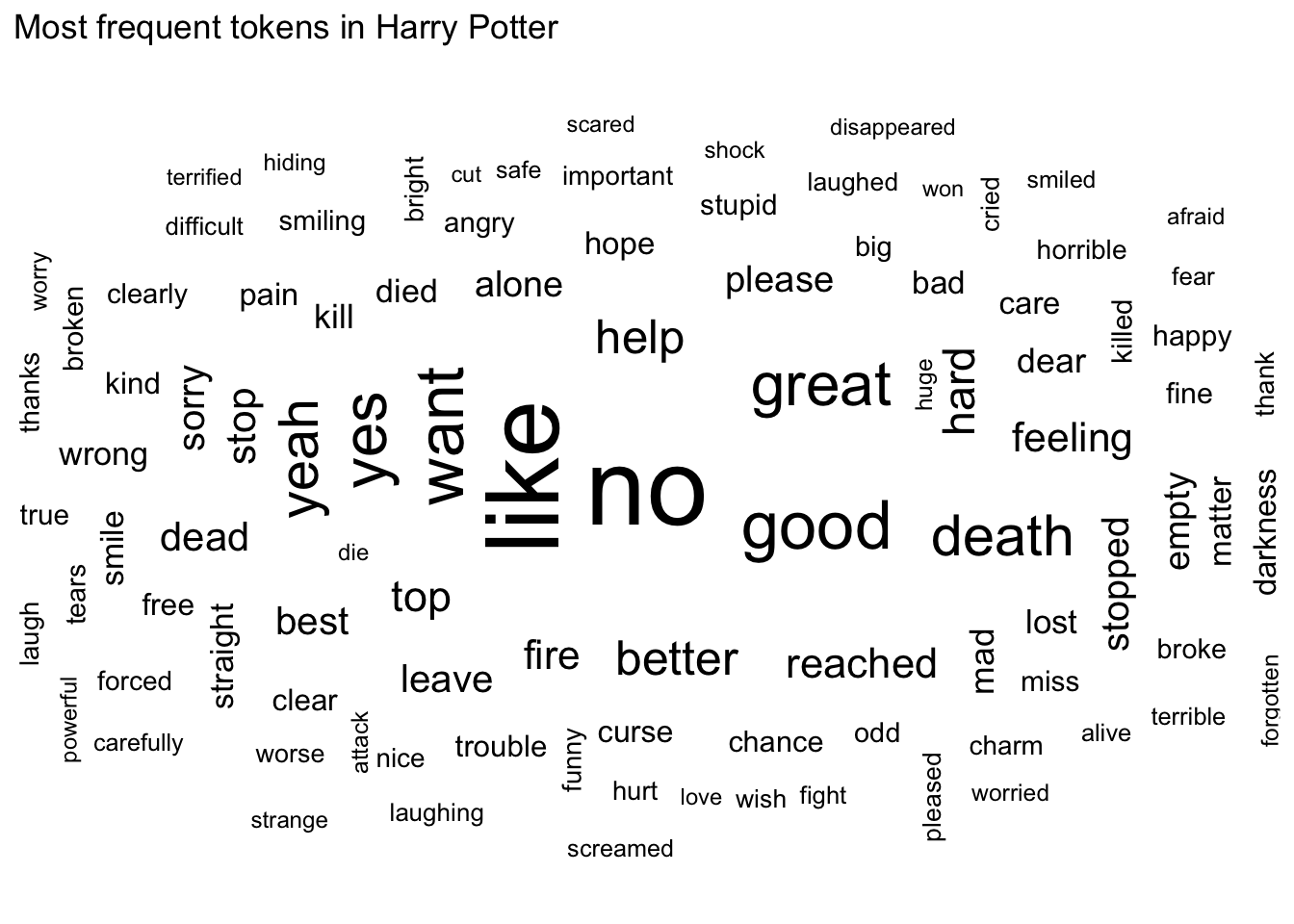
Visualize the positive/negative sentiment for each book over time using the AFINN dictionary
Click for the solution
hp_words %>%
inner_join(get_sentiments("afinn")) %>%
group_by(book, chapter) %>%
summarize(value = sum(value)) %>%
ggplot(mapping = aes(x = chapter, y = value, fill = book)) +
geom_col() +
facet_wrap(facets = vars(book), scales = "free_x") +
labs(
title = "Emotional arc of Harry Potter books",
subtitle = "AFINN sentiment dictionary",
x = "Chapter",
y = "Emotional score"
) +
theme(legend.position = "none")
## Joining, by = "word"
## `summarise()` has grouped output by 'book'. You can override using the
## `.groups` argument.
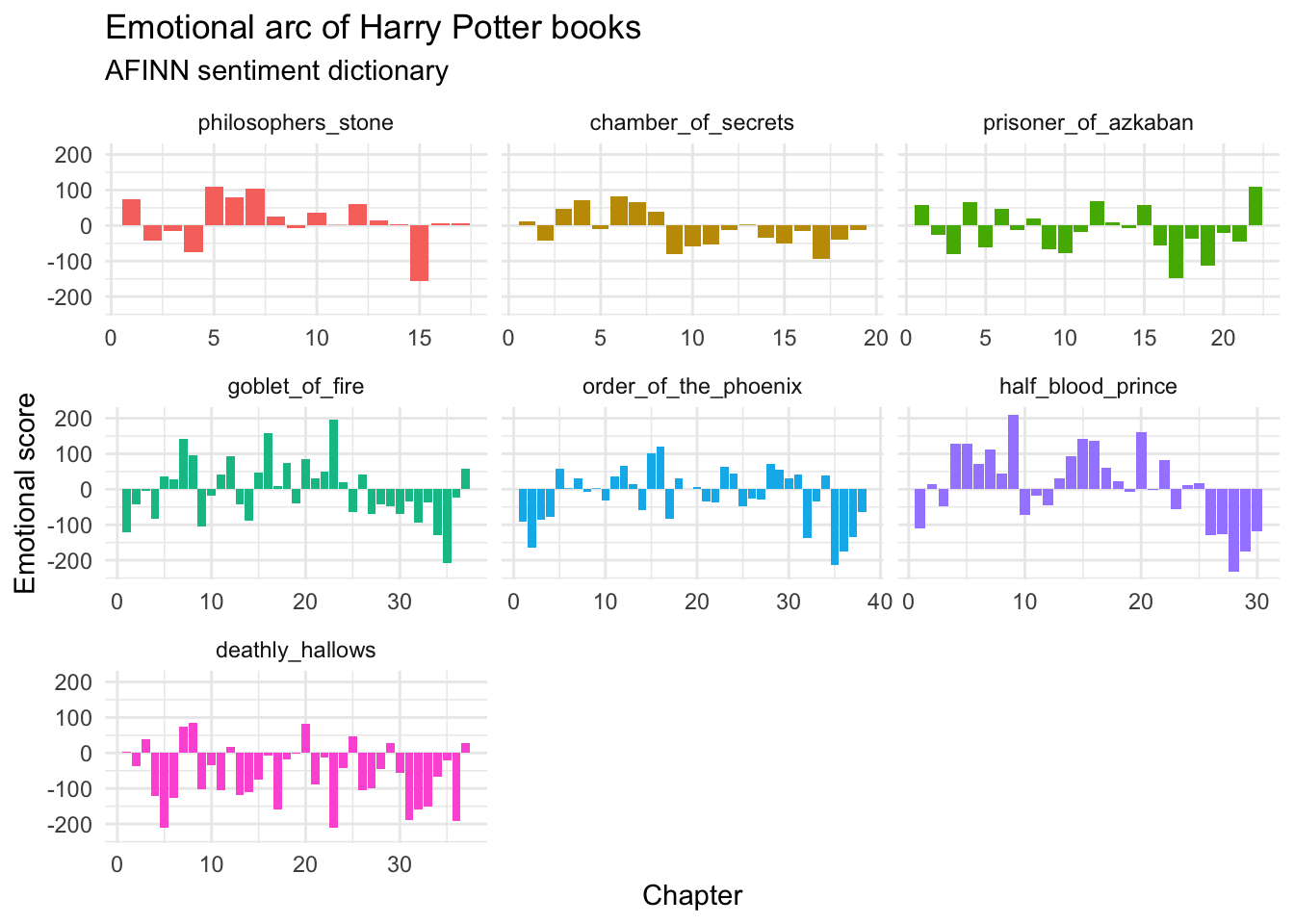
# cumulative value
hp_words %>%
inner_join(get_sentiments("afinn")) %>%
group_by(book) %>%
mutate(cumvalue = cumsum(value)) %>%
ggplot(mapping = aes(x = chapter, y = cumvalue, fill = book)) +
geom_step() +
facet_wrap(facets = vars(book), scales = "free_x") +
labs(
title = "Emotional arc of Harry Potter books",
subtitle = "AFINN sentiment dictionary",
x = "Chapter",
y = "Cumulative emotional value"
)
## Joining, by = "word"
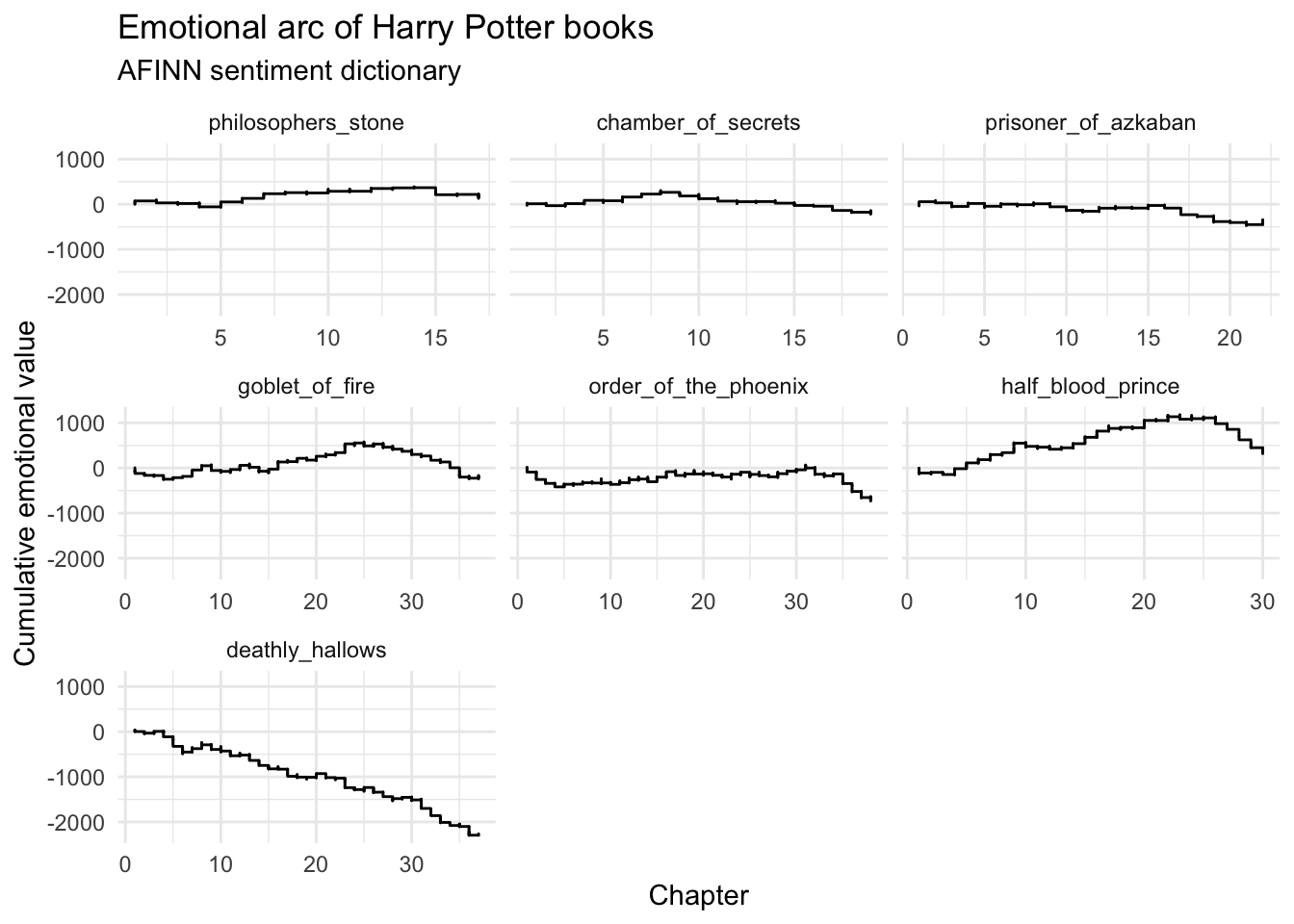
Acknowledgments
- This page is derived in part from Harry Plotter: Celebrating the 20 year anniversary with
tidytextand thetidyversein R and licensed under a Creative Commons Attribution-ShareAlike 4.0 International License.
Session Info
devtools::session_info()
## ─ Session info ───────────────────────────────────────────────────────────────
## setting value
## version R version 4.2.1 (2022-06-23)
## os macOS Monterey 12.2.1
## system aarch64, darwin20
## ui X11
## language (EN)
## collate en_US.UTF-8
## ctype en_US.UTF-8
## tz America/New_York
## date 2022-08-09
## pandoc 2.18 @ /Applications/RStudio.app/Contents/MacOS/quarto/bin/tools/ (via rmarkdown)
##
## ─ Packages ───────────────────────────────────────────────────────────────────
## package * version date (UTC) lib source
## assertthat 0.2.1 2019-03-21 [1] CRAN (R 4.2.0)
## backports 1.4.1 2021-12-13 [1] CRAN (R 4.2.0)
## blogdown 1.10 2022-05-10 [1] CRAN (R 4.2.0)
## bookdown 0.27 2022-06-14 [1] CRAN (R 4.2.0)
## broom 1.0.0 2022-07-01 [1] CRAN (R 4.2.0)
## bslib 0.4.0 2022-07-16 [1] CRAN (R 4.2.0)
## cachem 1.0.6 2021-08-19 [1] CRAN (R 4.2.0)
## callr 3.7.1 2022-07-13 [1] CRAN (R 4.2.0)
## cellranger 1.1.0 2016-07-27 [1] CRAN (R 4.2.0)
## cli 3.3.0 2022-04-25 [1] CRAN (R 4.2.0)
## codetools 0.2-18 2020-11-04 [1] CRAN (R 4.2.1)
## colorspace 2.0-3 2022-02-21 [1] CRAN (R 4.2.0)
## crayon 1.5.1 2022-03-26 [1] CRAN (R 4.2.0)
## DBI 1.1.3 2022-06-18 [1] CRAN (R 4.2.0)
## dbplyr 2.2.1 2022-06-27 [1] CRAN (R 4.2.0)
## devtools 2.4.4 2022-07-20 [1] CRAN (R 4.2.0)
## digest 0.6.29 2021-12-01 [1] CRAN (R 4.2.0)
## dplyr * 1.0.9 2022-04-28 [1] CRAN (R 4.2.0)
## ellipsis 0.3.2 2021-04-29 [1] CRAN (R 4.2.0)
## evaluate 0.15 2022-02-18 [1] CRAN (R 4.2.0)
## fansi 1.0.3 2022-03-24 [1] CRAN (R 4.2.0)
## farver 2.1.1 2022-07-06 [1] CRAN (R 4.2.0)
## fastmap 1.1.0 2021-01-25 [1] CRAN (R 4.2.0)
## forcats * 0.5.1 2021-01-27 [1] CRAN (R 4.2.0)
## fs 1.5.2 2021-12-08 [1] CRAN (R 4.2.0)
## gargle 1.2.0 2021-07-02 [1] CRAN (R 4.2.0)
## generics 0.1.3 2022-07-05 [1] CRAN (R 4.2.0)
## ggplot2 * 3.3.6 2022-05-03 [1] CRAN (R 4.2.0)
## ggwordcloud * 0.5.0 2019-06-02 [1] CRAN (R 4.2.0)
## glue 1.6.2 2022-02-24 [1] CRAN (R 4.2.0)
## googledrive 2.0.0 2021-07-08 [1] CRAN (R 4.2.0)
## googlesheets4 1.0.0 2021-07-21 [1] CRAN (R 4.2.0)
## gtable 0.3.0 2019-03-25 [1] CRAN (R 4.2.0)
## harrypotter * 0.1.0 2022-08-09 [1] Github (bradleyboehmke/harrypotter@51f7146)
## haven 2.5.0 2022-04-15 [1] CRAN (R 4.2.0)
## here 1.0.1 2020-12-13 [1] CRAN (R 4.2.0)
## highr 0.9 2021-04-16 [1] CRAN (R 4.2.0)
## hms 1.1.1 2021-09-26 [1] CRAN (R 4.2.0)
## htmltools 0.5.3 2022-07-18 [1] CRAN (R 4.2.0)
## htmlwidgets 1.5.4 2021-09-08 [1] CRAN (R 4.2.0)
## httpuv 1.6.5 2022-01-05 [1] CRAN (R 4.2.0)
## httr 1.4.3 2022-05-04 [1] CRAN (R 4.2.0)
## janeaustenr 0.1.5 2017-06-10 [1] CRAN (R 4.2.0)
## jquerylib 0.1.4 2021-04-26 [1] CRAN (R 4.2.0)
## jsonlite 1.8.0 2022-02-22 [1] CRAN (R 4.2.0)
## knitr 1.39 2022-04-26 [1] CRAN (R 4.2.0)
## labeling 0.4.2 2020-10-20 [1] CRAN (R 4.2.0)
## later 1.3.0 2021-08-18 [1] CRAN (R 4.2.0)
## lattice 0.20-45 2021-09-22 [1] CRAN (R 4.2.1)
## lifecycle 1.0.1 2021-09-24 [1] CRAN (R 4.2.0)
## lubridate 1.8.0 2021-10-07 [1] CRAN (R 4.2.0)
## magrittr 2.0.3 2022-03-30 [1] CRAN (R 4.2.0)
## Matrix 1.4-1 2022-03-23 [1] CRAN (R 4.2.1)
## memoise 2.0.1 2021-11-26 [1] CRAN (R 4.2.0)
## mime 0.12 2021-09-28 [1] CRAN (R 4.2.0)
## miniUI 0.1.1.1 2018-05-18 [1] CRAN (R 4.2.0)
## modelr 0.1.8 2020-05-19 [1] CRAN (R 4.2.0)
## munsell 0.5.0 2018-06-12 [1] CRAN (R 4.2.0)
## pillar 1.8.0 2022-07-18 [1] CRAN (R 4.2.0)
## pkgbuild 1.3.1 2021-12-20 [1] CRAN (R 4.2.0)
## pkgconfig 2.0.3 2019-09-22 [1] CRAN (R 4.2.0)
## pkgload 1.3.0 2022-06-27 [1] CRAN (R 4.2.0)
## png 0.1-7 2013-12-03 [1] CRAN (R 4.2.0)
## prettyunits 1.1.1 2020-01-24 [1] CRAN (R 4.2.0)
## processx 3.7.0 2022-07-07 [1] CRAN (R 4.2.0)
## profvis 0.3.7 2020-11-02 [1] CRAN (R 4.2.0)
## promises 1.2.0.1 2021-02-11 [1] CRAN (R 4.2.0)
## ps 1.7.1 2022-06-18 [1] CRAN (R 4.2.0)
## purrr * 0.3.4 2020-04-17 [1] CRAN (R 4.2.0)
## R6 2.5.1 2021-08-19 [1] CRAN (R 4.2.0)
## rappdirs 0.3.3 2021-01-31 [1] CRAN (R 4.2.0)
## Rcpp 1.0.9 2022-07-08 [1] CRAN (R 4.2.0)
## readr * 2.1.2 2022-01-30 [1] CRAN (R 4.2.0)
## readxl 1.4.0 2022-03-28 [1] CRAN (R 4.2.0)
## remotes 2.4.2 2021-11-30 [1] CRAN (R 4.2.0)
## reprex 2.0.1 2021-08-05 [1] CRAN (R 4.2.0)
## rlang 1.0.4 2022-07-12 [1] CRAN (R 4.2.0)
## rmarkdown 2.14 2022-04-25 [1] CRAN (R 4.2.0)
## rprojroot 2.0.3 2022-04-02 [1] CRAN (R 4.2.0)
## rstudioapi 0.13 2020-11-12 [1] CRAN (R 4.2.0)
## rvest 1.0.2 2021-10-16 [1] CRAN (R 4.2.0)
## sass 0.4.2 2022-07-16 [1] CRAN (R 4.2.0)
## scales 1.2.0 2022-04-13 [1] CRAN (R 4.2.0)
## sessioninfo 1.2.2 2021-12-06 [1] CRAN (R 4.2.0)
## shiny 1.7.2 2022-07-19 [1] CRAN (R 4.2.0)
## SnowballC 0.7.0 2020-04-01 [1] CRAN (R 4.2.0)
## stringi 1.7.8 2022-07-11 [1] CRAN (R 4.2.0)
## stringr * 1.4.0 2019-02-10 [1] CRAN (R 4.2.0)
## textdata 0.4.2 2022-05-02 [1] CRAN (R 4.2.0)
## tibble * 3.1.8 2022-07-22 [1] CRAN (R 4.2.0)
## tidyr * 1.2.0 2022-02-01 [1] CRAN (R 4.2.0)
## tidyselect 1.1.2 2022-02-21 [1] CRAN (R 4.2.0)
## tidytext * 0.3.3 2022-05-09 [1] CRAN (R 4.2.0)
## tidyverse * 1.3.2 2022-07-18 [1] CRAN (R 4.2.0)
## tokenizers 0.2.1 2018-03-29 [1] CRAN (R 4.2.0)
## tzdb 0.3.0 2022-03-28 [1] CRAN (R 4.2.0)
## urlchecker 1.0.1 2021-11-30 [1] CRAN (R 4.2.0)
## usethis 2.1.6 2022-05-25 [1] CRAN (R 4.2.0)
## utf8 1.2.2 2021-07-24 [1] CRAN (R 4.2.0)
## vctrs 0.4.1 2022-04-13 [1] CRAN (R 4.2.0)
## withr 2.5.0 2022-03-03 [1] CRAN (R 4.2.0)
## xfun 0.31 2022-05-10 [1] CRAN (R 4.2.0)
## xml2 1.3.3 2021-11-30 [1] CRAN (R 4.2.0)
## xtable 1.8-4 2019-04-21 [1] CRAN (R 4.2.0)
## yaml 2.3.5 2022-02-21 [1] CRAN (R 4.2.0)
##
## [1] /Library/Frameworks/R.framework/Versions/4.2-arm64/Resources/library
##
## ──────────────────────────────────────────────────────────────────────────────